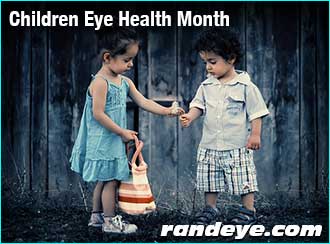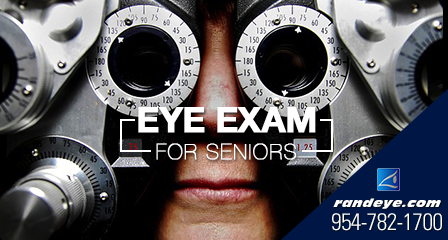Children Eye Health – Vision Warning Signs
It’s August and summer vacation is winding down, and students are preparing for another school year. This year, don’t forget to check an annual eye exam off their to do lists.
It is important to have your child’s eyes tested, because it can lead to greater success in the classroom because much of a child’s learning occurs visually.
Have you noticed any change in your child’s vision? Here are some signs and behaviors you can watch for that may indicate a child is struggling with his or her vision.

What does your child’s eyes look like?
• Eyes don’t line up, one eye appears crossed or looks outward;
• Eyelids are red-rimmed, crusted, or swollen; or
• Eyes are watery or red (inflamed).
Is Your Child Doing Any of the Following?
• Rubs eyes frequently;
• Closes or covers one eye;
• Tilts head or thrusts head forward;
• Has trouble reading or doing other close-up work, or holds objects close to eyes to see;
• Blinks more than usual or seems cranky when doing close-up work; or
• Squints eyes or frowns.
Does Your Child Say Any of the Following?
• “My eyes are itchy,”
• “My eyes are burning,”
• “My eyes feel scratchy,”
• “I can’t see very well”
• After doing close-up work, your child says, “I feel dizzy,” or “I have a headache,”
• “Everything looks blurry,” or “I see double.”
It is recommended that your child has annual eye exams, to screen for any abnormal changes in vision.
Tips for Independent Senior Living
There is a lot you can do to ensure an easy life for seniors who choose to live an independent life. Here are some small changes you can make, that will help your loved one live an easier life.

See an Ophthalmologist
Those with low vision can improve their quality of life through low vision rehabilitation, which teaches people how to use their remaining sight more effectively and can be arranged through an ophthalmologist – a medical doctor specializing in the diagnosis, medical and surgical treatment of eye diseases and conditions.
Make things Bigger
Sit closer to the television or to the stage at performances. Get large books, phone dials and playing cards. Also, carry magnifiers for help with menus, prescription bottles and price tags.
Make things Brighter
Make sure areas are well lit and cover shiny surfaces to reduce glare. For instance, drink coffee from a white mug and always use a felt-tipped pen with black ink.
Use Technology
Many of today’s newer technologies have applications that can help with low vision. For example, e-readers allow users to adjust the font size and contrast. Many smartphones and tablets can be used to magnify print, identify cash bills and provide voice-navigated directions.
Organize and Label
Designate spots for your keys, wallet and frequently used items in your refrigerator. Mark thermostats and dials with high contrast markers from a fabric store; label medications with markers or rubber bands; and safety-pin labels onto similarly colored clothing to tell them apart.
Eye Checkup for Seniors
Seniors enjoy their independence just as we do! That’s why regular checkups and screenings are very important, as you age.
An annual eye checkup is a simple, low-stress way to keep tabs on your eye and overall health.
Here are some of the things your doctor will be looking for:

Age-related macular degeneration (AMD)
This is the leading cause of blindness among seniors. But, early detection and treatment can slow its progress significantly. There are a couple different types of AMD. The type determines the treatment – ranging from laser surgery, medication or dietary supplements to slow the disorder.
Glaucoma
Glaucoma has been called, “the silent thief of sight” because too often, it goes unnoticed before too much damage is done to save vision. It’s caused by too much pressure in the eyes. When doctors catch it early, they can often manage it effectively and prevent vision loss.
Cataracts
Cataracts are a nearly unavoidable part of aging. Over time, the lens in the eyes can get cloudy and yellow. But, updated eyewear prescriptions can often delay surgery, which is easy and low-risk.
Diabetic retinopathy
This affects diabetic patients and can rob sight. The tiny blood vessels in the eye that feed the retina become damaged and allow fluids to seep into the eye. Treatment includes changes in diet and exercise, and also surgery.
Refractive errors
Vision changes and usually worsens with age. A yearly checkup will help keep vision sharp with updated eyewear prescriptions.
Healthy Eye Tips for Those Over 60!
Nutrition Is a key component in healthy eyes
To keep your eyes working healthy and properly, choose foods that are rich in antioxidants like vitamin A and C, such as leafy, green vegetables and fish. Many foods, especially fish, contain omega-3 fatty acids that are essential to the health of macula and other parts of the eye.

Smoking affects eye health, too
Smoking exposes your eyes to high levels of oxidative stress. Smoking increases the risk of developing a variety of conditions that affect your eye health.
Step away from your computer screen
After hours of staring at the computer, your eyes end up feeling the same kind of repetitive stress in your eye muscles as your wrists. When working on the computer, try to:
- Keep your computer at a 20’-24’ distance from your eyes.
- Keep the top of your computer screen slightly below your eyes.
- Adjust the lighting to minimize glares on your screen.
- Take a break every 15 minutes to focus on an object in the distance.
- Remember to blink frequently!
Exercise
Believe it or not, exercise is very important for eye health. Exercise helps improve blood circulation, which, in return, improves oxygen levels to the eyes and the removals of toxins. Regular exercise also helps keep our weight in the normal range, which reduces the risk of diabetes and diabetic retinopathy.
Happy Independence Day – Eye Safety
As the fourth of July celebrations usually include fireworks, we urge you to celebrate with caution.
Fireworks injure over 9,000 people a year, and 47% of those people were just bystanders. The safest way to enjoy fireworks for this upcoming 4th of July is to remain at least 500 ft. away from where the fireworks are being lit.
Children are frequent victims of firework related injuries: 30 percent of those who have sustained a fireworks injury near the Fourth of July holiday are age 15 and under.
If you or someone else are setting off fireworks you should follow safety tips:
- Make sure the person lighting the fireworks has protective eyewear.
- Make sure they never try to relight a “dud” firework.
- Make sure only one firework is being lit at a time, never attempt to light more than one.
- Never aim a firework at a person, pet, vehicle, house, or any structure or something flammable.
- Always keep a supply of water or fire extinguisher near by at all times as a safety precaution.
- When storing fireworks, keep them in a cool, dry and safe place, away from children and pets.
- Lastly, one should leave the area where the fireworks are being shot off from, unless it is a trained professional, in which case one should remain at least 500 ft. away.
If you are injured from fireworks:
- Seek medical attention right away.
- If any particle enters your eye, don’t touch or rub it.
- Do not rinse your eyes.
- If a sharp object enters your eye, do not pull it out. Carefully place a loose bandage on the eye and do not apply pressure.
- Do not take any blood-thinning medication such as aspirin.
Stay safe this holiday, and have fun!
We are celebrating senior independence month this July
Each day approximately 10,000 Americans turn 65 and one in every six adults this age and older has some type of vision impairment that cannot be corrected with either glasses or contacts.
As we celebrate our independence this July, it is important to keep in mind the independence of our older loved ones.
To ensure a safe and happy independent lifestyle, we need to make sure that our eyes are working at their best.
Here are some 7 sight-saving habits that will help maintain independence for seniors.
1. Get an Eye Exam.
Adults age 65 and over should get a medical eye exam every one-to-two years. Regular eye exams are very important in spotting changes in vision, which could be a symptom for a serious eye disease or condition.
2. Know the Symptoms of Vision Loss.
Signs of vision loss may become apparent when reading, writing, shopping, watching television, driving a car or even recognizing faces becomes more difficult. You vision problems may cause you to bumping into or knocking over objects, take steps hesitantly, squinting or tilting the head when trying to focus. If you’ve had to do any of these, let your doctor know!
3. Make Eye-Healthy Food Choices.
A diet low in fat and rich in fruits, vegetables and whole grains benefits the entire body, including the eyes. Studies show that foods rich in vitamins C and E, zinc, lutein and zeaxanthin are good for eye health. Some eye-healthy foods include citrus fruits, vegetable oils, nuts, whole grains, dark green leafy vegetables and cold-water fish.
4. Quit Smoking.
Avoiding smoking and second hand smoke – or quitting, for current smokers – are some of the best investments everyone can make for long-term eye health. Smoking increases risk for eye diseases like cataract and age related macular degeneration and can raise the risks of cardiovascular diseases that can influence the eye problems.
5. Maintain Normal Blood Pressure, Cholesterol and Glucose Levels.
High blood pressure, cholesterol and blood glucose levels can all lead to an increase risk of vision loss from an eye disease. Always try to keep these levels under control, and maintain a healthy lifestyle.
6. Get Regular Physical Activity.
Thirty minutes of exercise a day can benefit your heart, waistline and energy levels, and also do some good for your eyesight! Many eye diseases are linked to other health problems, such as high blood pressure, diabetes and high cholesterol levels.
7. Wearing Sunglasses.
Exposure to ultra violet (UV) light can raise the risks of some eye problems, including cataract, growths on the eye and cancer. Always wear sunglasses with 100 percent UV protection, and a hat while enjoying time outdoors.
Father’s Day 2015
The Rand Eye Institute would like to say “Thank You” to all the Fathers out there.
For all the time, hard work, patience, love, care and everything else that you put into being a Father, we extend our greatest gratitude.
HAPPY FATHER’S DAY!!!
What is the treatment for cataracts?
Cataracts are a clouding of the lens of the eye, which prevents passage of light into the eye. The solution to cataracts is cataract surgery, which requires a surgeon to remove the deteriorated lens and replace it with an artificial lens called an intraocular lens or IOL. Over 3 million Americans undergo cataract surgery annually, making it one of the most common surgeries in the United States. In fact, the entire surgery lasts only about 20 minutes, and most people can resume normal activities fairly rapidly.

Is cataract removal safe?
Cataract surgery is one of the safest and most effective surgeries with a success rate of 98 percent or greater. Your surgeon will remove your clouded lens and replace it with an intraocular lens (IOL). Only a miniscule incision in the cornea is necessary to do this procedure, and it can be completed in about 15 minutes in an accredited outpatient surgery center.
Do cataracts only affect seniors?
Cataracts can affect anyone! Although most people do not show symptoms of cataracts until at least the age of 40, cataracts can also affect young adults or even children. Heredity, disease, eye injury and smoking could cause cataracts to develop at an earlier age.
Can I prevent cataracts?
There is no proven way to prevent age-related cataracts. But, choosing a healthy lifestyle can slow the progression of cataracts. Some ways to delay the progression of cataracts is to avoiding smoking, reducing exposure to UV rays, eating healthy foods, and wearing proper eye protection when playing sports or working.
To learn more about Custom Laser Cataract treatments and Refractive Cataract Surgery go to: https://www.randeye.com/cataract/
Types of Cataracts
Cataracts usually occur in adults and are age-related. There are three main types of cataracts and their names are related to the part of the lens that is affected.
-
Nuclear Cataract
This type of cataract develops when the center of your lens (the nucleus) becomes hardened over time. This may at first cause you to become more nearsighted, and you may even experience improvements in your reading vision. But with time, the lens gradually turns yellow and clouds your vision.
-
Cortical Cataract
This type of cataract begins at the outer edge (cortex) of your lens and spreads toward the center of your lens. It begins as a whitish, wedge-shaped opacities and streaks on the outer edge of the lens cortex. As it slowly progresses, the streaks extend to the center and interfere with light passing through the lens.
-
Subcapsular Cortex
This type of cataract develops on the back of your lens. This type often interferes with your reading vision, reduces your vision in bright light and causes glares and halos around lights at night.
-
Congenital Cataracts
Some people are born with cataracts or develop them as children. These cataracts also may be due to certain conditions, like myotonic dystrophy, Galactosemia, Lowe’s syndrome or rubella. Congenital cataracts don’t always affect vision, but if they do they are usually removed soon after detection.
If you experience any of these conditions, or may show signs of early cataract development, give us a call at 954-782-1700 to schedule a consultation.
Learn more about Cataract procedures and options: https://www.randeye.com/cataract/
Hurricane Preparedness & Safety Tips
Hurricane season officially begins June 1st and lasts until the 30th of November. During these times, it is important to take the necessary steps in preparing in case a hurricane hits!

Before a Hurricane
- Have a disaster plan.
- Refill prescriptions and Medications (minimum 7 days supply)
- Baby essentials (bottles, formula, baby food, diapers)
- Have a First Aid kit.
- Have a pet plan. Before a storm threatens, contact your veterinarian or local humane society for information on preparing your pets for an emergency.
- Board up windows.
- Bring in outdoor objects that could blow away.
- Make sure you know which county or parish you live in.
- Know where all the evacuation routes are.
- Prepare a disaster supplies kit for your home and car. Have enough food and water for at least 3 days. Include a first aid kit, canned food and a can opener, bottled water, battery-operated radio, flashlight, protective clothing and written instructions on how to turn off electricity, gas, and water.
- Have a NOAA weather radio handy with plenty of batteries, so you can listen to storm advisories.
- Have some cash handy. Following a hurricane, banks and ATMs may be temporarily closed.
- Make sure your car is filled with gasoline.
During a Hurricane
- Stay away from low-lying and flood prone areas.
- Always stay indoors during a hurricane, because strong winds will blow things around.
- Leave mobile homes and to go to a shelter.
- If your home isn’t on higher ground, go to a shelter.
- If emergency managers say to evacuate, then do so immediately.
After a Hurricane
- Stay indoors until it is safe to come out.
- Check for injured or trapped people, without putting yourself in danger.
- Watch out for flooding which can happen after a hurricane.
- Do not attempt to drive in flooding water.
- Stay away from standing water. It may be electrically charged from underground or downed power lines.
- Don’t drink tap water until officials say its safe to do so.
Always stay informed and advise family members of your plans.




